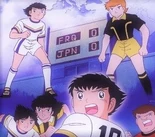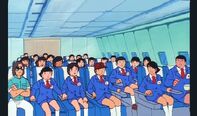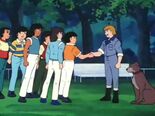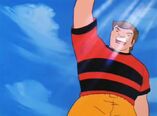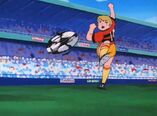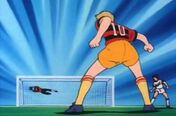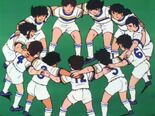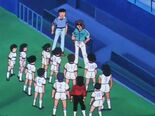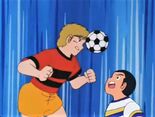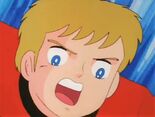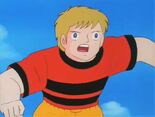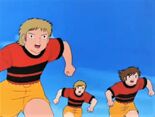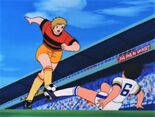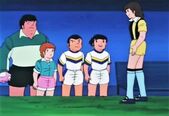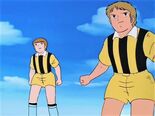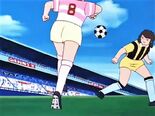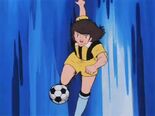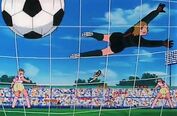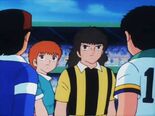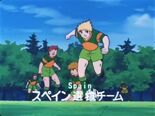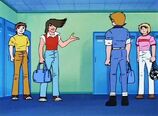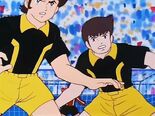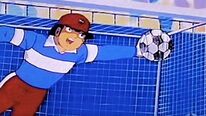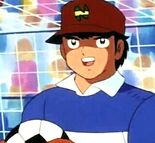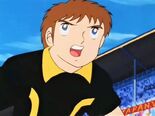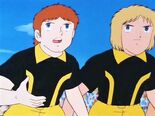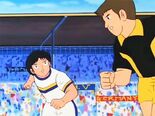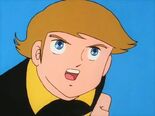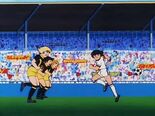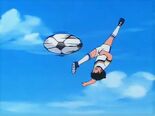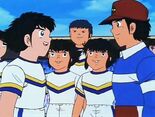- U-13 International tournament redirects here. For the film series tournament, see Captain Tsubasa: Europa Daikessen (1985 film).
The U-13 International tournament, or European Jr. Tournament is an original arc from the 1983 anime.
Description[]
Katagiri as a JFA representative puts together a team of the 16 best players in the last 6th All-Japan Boys' Football Tournament known as U-13 Japan. They all traveled to Europe to participate in the U-13 International tournament against the most powerful European teams.
Venues[]
- Paris, France: At least two quarter-finals and a semi-final.
- Cologne, West Germany[1]: At least a quarter-final, a semi-final and the final.
Results[]
- Main article: U-13 International Tournament (table)
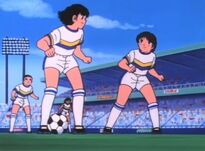
Challenge match[]
- Δ Genzo Wakabayashi ? - ? Steve Δ (interrupted)
Quarterfinals[]
- ○ U-13 England 2 - 3 U-13 Japan ●
- ● U-13 France 1 - 0 U-13 Italy ○
- ● U-13 Germany 3 - 0 U-13 Portugal ○
- ● U-13 Spain ? - ? U-13 Norway [2] ○ (Victory of Spain)
After it came in the run-up to friction between the Japanese players Hyuga and Wakabayashi and the English captain Steve, met the two national teams already in the quarter-finals to each other. At first the English players underestimated Japan and conceded a quick goal (from the Tachibanas), but there were several mistakes made by the Japanese during the first half, including Wakabayashi and Hyuga, which put England off to a deserved 2-1 lead. The Japanese exchanged players during the break and, thanks to the players Tsubasa, Misaki and Matsuyama, they turned the game into a close 3-2 victory. This was quite a surprise for the fans, as it was the first debut of the underappreciated Japanese team in an European tournament.
The U-13 France game against U-13 Italy was dominated by the French hosts from the start. Pierre flashed off his technical and elegant skills and played the Italian defense almost single-handedly to score the first goal. The rest of the game is not known, but it can be guessed that the Italians had no chance at any time. In the match between Germany and Portugal, German captain and striker Schneider scored three goals in the first five minutes. He played his pure dominance and proved that he was at this time the best youth player in Europe and was rightly scouted by several clubs.
Semifinals[]
- ○ U-13 France 1 - 2 U-13 Japan ●
- ● U-13 Germany 4 - 0 U-13 Spain ○
In the match between Japan and France, the French dominated thanks to their captain Pierre. Only thanks to the outstanding performance of Ken Wakashimazu led the French only with 1:0. Tsubasa, whose performances were underground, embarked on a duel with Pierre, but forgot his teammates in the process. After the half-time break, he found his pace and style again and helped Japan thanks to his two goals to move into the finals.
The other semi-final match between U-13 Germany and U-13 Spain remained hard fought until the break. However, when the Germans substituted their star player Schneider for the second half and scored three goals in five minutes, they had already decided who would go to the finals against Japan.
Finals[]
- Δ U-13 Germany 2 - 2 U-13 Japan Δ (both teams resulted champions)
The finals, which were to be taken place in the in Cologne Statium in West Germany, was to be the final test for the Japanese team to adapt and battle the European soccer. After attempts to score against the amazing keeper Hefner, Germany does a counter-attack. Schneider attempts to shoot against Wakashimazu with his "Best Shoot" but instead uses his "Feint Shoot" (a less powerful shot with his weaker leg) to trick the Karate goalkeeper. Fastly enough, Schneider dribbles against the Tachibanas and uses his speed and his strong legs to not falter against any tackle. Now, Schneider himself uses his "Best Shoot" to throw a power bullet shoot directly to Wakashimazu's face, hitting him with it and making the ball enter together into the goal, scoring 2:0 against U-13 Japan.
Similar to the 1985 film, S.G.G.K. Wayabayashi enters for the second half-time in order to ease his teammates. When Schneider entered the area to score, Wakabayashi decided to close his eyes, attempting to predict the "Best Shoot" (a powerful top-spin shot) from Schneider, being able to catch it, using his "Telepathy saving".
Inmediately after, Tsubasa attempts to score with a volley Overhead Kick but Schneider counters it. Then, since the ball is still on field, Tsubasa rushes at the same time than Hyuga, scoring 1:2 with a Twin Shot against Hefner.
In order to win the game, Hans centers the ball with a curved shot, making Wakabayashi to punch the ball so as to leave the area clear for Schneider to shoot the loose ball, and, since he was desperate to score, Hyuga knew the Kaiser was going to score with his right foot and use his "Best shoot" and shouts Genzo to dive to the left and he catches it.
With just the loss-time minutes to end the game, Matsuyama passes the ball to Misaki who, at the same time does a finally, with an Overhead Pass to Hyuga who does another Ooverhead Pass to Tsubasa. Tsubasa jumps to make another overhead and, with this Combi "Overhead Kick", they are able to defeat Hefner, making Japan able to tie Germany with a 2:2.
Trivia[]
- This tournament is called "Torneo juvenil en Europa" in the Latin American dub.
- The tournament occurs only in the Captain Tsubasa anime and is therefore not perfectly canonical, but can easily be classified in the canon.
- In the Captain Tsubasa anime, the tournament is first mentioned in a flashback since Tsubasa fantasized shortly before the final of the 16th Middle School tournament in high fever. So far, the tournament was not discussed in any manga series and is therefore considered not canon.
- In the tournament, Schneider and Pierre are introduced for the first time (even before the manga). However, their appearance differs greatly from the Shin Captain Tsubasa version. Here, Pierre has brown hair and is named different, while Schneider's haircut deviates and appears here as darker blonde. Steve's character will be a prototype character for the English Robson, similar to Hefner, who will be later replaced with Deuter Muller.
Gallery[]
Notes[]
- ↑ Since the 1983 Anime and the Manga were made before the "Fall of the Berlin Wall", the main German selection team and Jr. youths teams known in the anime and the 1989 OVA are still called West Germany Jr. or U-13 Germany.
- ↑ The information comes from Captain Tsubasa's article in the September 1985 issue of Animemedia.

